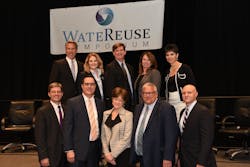SAN DIEGO, CA, SEPT 11, 2019 -- The U.S. Environmental Protection Agency (EPA), alongside federal partners including the White House Council on Environmental Quality, U.S. Army Corps of Engineers, Department of Interior, Department of Agriculture, Department of Energy, and Bureau of Reclamation, released a draft of the National Water Reuse Action Plan at the 34th Annual WateReuse Symposium in San Diego this week. The draft plan will be open for public comment for 90 days following its publication to the Federal Register, during which EPA will solicit feedback on how to prioritize and implement the proposed actions.
The draft plan outlines a set of proposed actions aimed at supporting and advancing water reuse across the country. These include actions that can be led by federal government agencies, as well as actions that can be led by industry experts, the private sector, and the research community.
“We commend EPA and David Ross, Assistant Administrator for Water, for launching this initiative and taking meaningful steps to break down barriers and create opportunities for water recycling in the U.S.,” said Patricia Sinicropi, Executive Director of the WateReuse Association. “The actions outlined in the draft plan will help connect the dots and scale up recycling for a wide variety of important uses.”
During the past eight months, the WateReuse Association engaged its membership and the broader stakeholder community to generate ideas for the national action plan. This process included facilitating a multi-month collaboration to develop recommendations jointly with the American Water Works Association, Association of Metropolitan Water Agencies, National Association of Clean Water Agencies, Water Environment Federation, and Water Research Foundation. We are pleased to see many of those recommendations reflected in the draft action plan.
Recycled water has a multitude of applications, including agricultural irrigation, industrial cooling, environmental restoration, and drinking water supply augmentation, among others. The draft action plan supports each of these uses, and acknowledges the variety of drivers leading communities, businesses, and others toward water recycling, including drivers related to concerns over water supply, water quality water security and overall sustainability.
“Forty states anticipate experiencing fresh water shortages in certain regions within their borders over the next decade,” said U.S. EPA’s Assistant Administrator for Water David Ross. “Diversifying our nation’s water portfolio must be a nationwide priority, and water reuse has the potential to ensure the viability of our water economy for generations to come.” In the coming months, the WateReuse Association will work with EPA, other federal agencies, and its members and partners to flesh out the action plan, with a focus on developing implementation details for priority actions.



